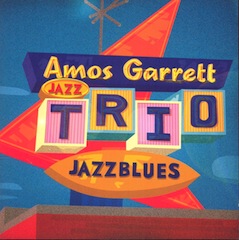JAZZBLUES
Amos Garrett Jazz Trio
Stony Plain
Eight cool and medium-cool jazz and blues performances recorded live at different venues in 2010 and 2011 by ace guitarist Amos Garrett accompanied by Keith Smith on guitar and Greg Carroll on string bass is yet more evidence of Garrett’s impressive versatility. Equally so, it’s evidence of how much heart he puts into his playing along with a friskiness that puts an extra jump into, say, a scintillating take on Miles Davis’s “Freddie Freeloader,” the album opener. Garrett’s full-bodied sound signature throughout echoes past masters of the semi-hollow body such as Howard Roberts, Johnny Smith, Chet Atkins and Joe Pass, and fellow guitarist Smith is right there with him fashioning contrasting textures or shadowing Garrett with admirable sensitivity to the introspective nature of the proceedings.
Garrett, who’s accompanied a Who’s Who of pop, rock and folk artists over the course of his career, in addition to pursuing his own solo work, dips into some impressive songbooks for the eight tunes comprising JazzBlues, and his cohorts mesh seamlessly with the sensibility he brings to the fray. Monk’s “Mysterioso” features a laconic dialogue between Garrett and Smith, captivatingly flavored with upper- and lower-neck textures as it wends it way through six-and-a-half minutes of slow grooving conversation; conversely, on “Blue Monk,” the two pickers engage in casual back-and-forth for about three-quarters of the song’s near-four-minute length before they subtly merge lanes and bring the song home in tandem. Freddie Hubbard’s “Little Sunflower” glides aloft for ten minutes-plus on wings of Wes Montgomery-like octave chords and a certain exotic flavor in the hypnotic ostinato chording and spacey upper-neck soloing. Though the album is mostly instrumental, Amos does step up to the plate as an engaging vocalist on a sensuous treatment of the pop standard “Cocktails for Two,” his accent and the little knowing swoop in his phrasing recalling no singer so much as the singular stylist Maurice Chevalier—it’s the album’s most unexpected moment and it’s most delightful in its winking suggestiveness. The album’s only other vocal, by Roberta Donnay on the Johnny Mercer-Hoagy Carmichael standard, “Skylark,” is close to being a disaster, as she never quite connects with the groove or the mood Garrett and company are trying to establish and goes wandering all over the place searching for her place in the proceedings. Even so, Garrett fashions one of the album’s most tender solos following the second verse, creating a glow that overcomes even the singer’s clumsy warbling at song’s end. All in all, JazzBlues offers a fair share of memorable moments and engages the listener on multiple levels, especially in the heart. Amos should bring the trio around more often.
AUDIO CLIP: Amos Garrett, ‘Cocktails for Two,’ from the Amos Garrett Trio’s JazzBlues album




